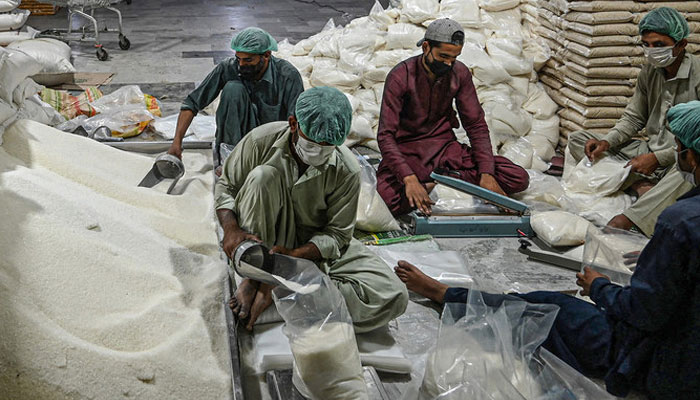Export of 150,000 tonnes of sugar allowed
SAB had previously postponed sugar export approvals, haunted by the wheat import scandal and its subsequent public scrutiny
ISLAMABAD: In a move laden with caution and regulatory scrutiny, the Pakistani government has conditionally approved the export of 150,000 (0.15 million) metric tons of sugar, mandating the Pakistan Sugar Mills Association (PSMA) to maintain adequate local stocks to ensure stable domestic supply and prices.
The recent decision emerged from a crucial meeting of the Sugar Advisory Board (SAB), chaired by Federal Minister for Industries and Production Rana Tanveer Hussain. The SAB, an authoritative tripartite body, includes representatives from federal and provincial governments, the sugar industry, and key stakeholders such as Kissan Ittehad.
Notably, the SAB had previously postponed sugar export approvals, haunted by the wheat import scandal and its subsequent public scrutiny. The PSMA had earlier asserted the presence of a 1.5-million-ton sugar surplus, advocating for its export permission. However, the government, wary of past market disruptions, conducted thorough verification to authenticate these stock claims and ensure that the process would not trigger price hikes.
Emphasising the need for a stable domestic sugar supply at sustainable prices, the SAB came to an agreement with the PSMA for the exports. Minister Hussain stated that the ex-mill sugar price would not be increased under any circumstances and directed the PSMA to prioritise clearing all pending payments to farmers. The SAB will review sugar prices and market stability again in a fortnight, and future sugar exports would depend on price stability and stock availability within the country, Hussain said.
In January 2023, the coalition government of Pakistan Democratic Movement (PDM), led by Shehbaz Sharif, permitted export of 250,000 tons of sugar based on projections suggesting a surplus. That decision backfired as domestic prices soared from Rs100 per kg to Rs190 per kg by August 2023. By late August, the caretaker government revealed that national sugar reserves had plummeted to 2.3 million metric tons, insufficient to meet demand until the next crushing season. This disclosure raised alarms about the potential misreporting of sugar production and consumption figures by both the industry and the previous government, further complicating the export narrative. Consequently, sugar exports were banned, and the sugar producers’ appeals for resumption faced outright rejection until the cane-crushing season concluded in March 2024.
The SAB, while reviewing sugar stock availability, market prices, sugarcane rates, global sugar market prices, and industry production costs, emphasized the importance of maintaining sufficient local stocks to ensure a stable supply of sugar at sustainable prices.
-
 Travis Kelce Plays Key Role In Taylor Swift's 'Opalite' Remix
Travis Kelce Plays Key Role In Taylor Swift's 'Opalite' Remix -
 How Jennifer Aniston's 57th Birthday Went With Boyfriend Jim Curtis
How Jennifer Aniston's 57th Birthday Went With Boyfriend Jim Curtis -
 JoJo Siwa Shares Inspiring Words With Young Changemakers
JoJo Siwa Shares Inspiring Words With Young Changemakers -
 James Van Der Beek Loved Ones Breaks Silence After Fundraiser Hits $2.2M
James Van Der Beek Loved Ones Breaks Silence After Fundraiser Hits $2.2M -
 Disney’s $336m 'Snow White' Remake Ends With $170m Box Office Loss: Report
Disney’s $336m 'Snow White' Remake Ends With $170m Box Office Loss: Report -
 Travis Kelce's Mom Donna Kelce Breaks Silence On His Retirement Plans
Travis Kelce's Mom Donna Kelce Breaks Silence On His Retirement Plans -
 Premiere Date Of 'Spider-Noir' Featuring Nicolas Cage Announced
Premiere Date Of 'Spider-Noir' Featuring Nicolas Cage Announced -
 Pedro Pascal's Sister Reveals His Reaction To Her 'The Beauty' Role
Pedro Pascal's Sister Reveals His Reaction To Her 'The Beauty' Role -
 Kate Middleton Proves She's True 'children's Princess' With THIS Move
Kate Middleton Proves She's True 'children's Princess' With THIS Move -
 Paul Anka Reveals How He Raised Son Ethan Differently From His Daughters
Paul Anka Reveals How He Raised Son Ethan Differently From His Daughters -
 'A Very Special Visitor' Meets Queen Camilla At Clarence House
'A Very Special Visitor' Meets Queen Camilla At Clarence House -
 Jodie Turner Smith Shares One Strict Rule She Follows As A Mom
Jodie Turner Smith Shares One Strict Rule She Follows As A Mom -
 Hailey Bieber Reveals KEY To Balancing Motherhood With Career
Hailey Bieber Reveals KEY To Balancing Motherhood With Career -
 Photo Of Jay-Z, Other Prominent Figures With Jeffrey Epstein Proven To Be Fake
Photo Of Jay-Z, Other Prominent Figures With Jeffrey Epstein Proven To Be Fake -
 Hillary Clinton's Munich Train Video Sparks Conspiracy Theories
Hillary Clinton's Munich Train Video Sparks Conspiracy Theories -
 Fans Slam Talk Show Host For 'cringe' Behavior In Chris Hemsworth Interview
Fans Slam Talk Show Host For 'cringe' Behavior In Chris Hemsworth Interview




